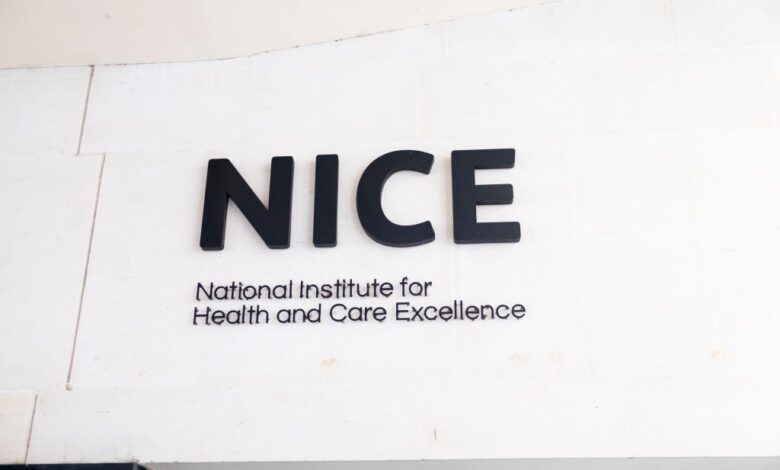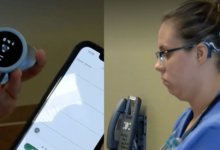‘Transformative’ sickle cell disease treatment closer to approval

A successful appeal to the UK’s authority on health and care has meant a new treatment for sickle cell disease is one step closer to approval.
The National Institute of Health and Care Excellence (NICE) announced last week that it will reconsider voxelotor (Oxbryta), after it rejected it for routine and managed access in October.
“People are living with this condition, watching the decades slide by, and are seeing absolutely no change in the range of treatments they can access”
John James
Voxelotor is a haemoglobin S (HbS) polymerisation inhibitor that can be used to treat haemolytic anaemia caused by sickle cell disease.
It binds to HbS, thereby increasing oxygen binding affinity and inhibiting HbS polymerisation, resulting in reduced sickling and damage to red blood cells.
John James, chief executive of the Sickle Cell Society, which represents people with the condition, said the drug could have a “transformative impact” on patients and help to address health inequalities faced by them.
The profile of sickle cell disease, which is the UK’s largest genetic blood condition, has been raised recently after a series of investigations were held into deaths of patients due to failings in nursing care.
If ultimately approved by NICE for use in the UK, voxelotor would, Mr James said, significantly change the way people with the disease are cared for.
On 5 December, NICE published the results of an appeal made about its previous refusal to recommend voxelotor for routine or managed access.
Read more about sickle cell disease
This refusal, published in July, was made on the grounds that trials by the drug’s manufacturer, Pfizer, failed to show enough evidence of voxelotor’s long-term or wide population effectiveness or commercial viability.
NICE’s final draft guidance on the use of Voxelotor said that it was not persuaded, even balanced against its potential to reduce health inequalities for under-served sickle cell patients, that the drug should be approved.
Pfizer and the Sickle Cell Society lodged an appeal with NICE in October to ask it to reconsider its decision.
Pfizer, in its appeal letter, said it was “disappointed” with the decision and claimed NICE had made errors both in the way it had conducted the evidence gathering process and in the conclusions it drew from the voxelotor trials.
What is sickle cell disease?
Sickle cell disease is a genetic red blood cell condition. It affects haemoglobin and causes red blood cells to form in an abnormal, crescent (or sickle) shape.
This prevents the efficient movement of oxygen around the body and causes build-ups of blood cells. In turn, this can cause respiratory difficulties, severe pain and fatigue.
Sickle cell crisis is when a patient with sickle cell disease experiences acute symptoms or complications relating to the disease. It is a medical emergency, and can cause extreme pain and more severe versions of their chronic symptoms.
Patients experiencing sickle cell crisis, according to National Institute for Health and Care Excellence (NICE) guidance, should be given pain relief, normally in the form of opioids such as morphine, within 30 minutes of A&E admittance.
Best practice then states they should be treated with a patient-controlled analgesia (PCA) pump, which gives them constant background doses of morphine and allows the patient to administer bolus doses for when the pain becomes unbearable.
The use, set up and monitoring of these pumps requires specific training for nurses.
The disease affects around 12-15,000 people in the UK. The vast majority are of Black African or Caribbean ethnicity.
Because of this, many Black sickle cell patients have reported being treated poorly by healthcare staff.
These bad experiences include being perceived as drug addicts when requesting the NICE-approved high morphine doses and finding themselves struggling to access care in the first place.
Nursing Times sickle cell clinical resources
The Sickle Cell Society added that it believed that NICE did not act “fairly” during the appraisals and urged it to take the drug’s potential to level out health inequalities further into account.
A further appeal request was lodged by the UK National Haemoglobinopathy Panel.
On Tuesday, NICE announced that its panel had upheld the majority of Pfizer and the Sickle Cell Society’s appeal claims.
Now, the organisation will create and publish new draft guidance on the use of voxelotor; this new guidance may or may not lead to the recommendation of the drug’s use.
Mr James was optimistic that the appeal would lead to the drug getting a “positive review”, which takes fully into account “the health inequalities experienced by the sickle cell community”.
Mr James said: “The systemic deficiencies in the treatment and care of those affected by this condition include access to new safe and effective disease modifying treatments.
“People are living with this condition, watching the decades slide by, and are seeing absolutely no change in the range of treatments they can access,” he said.
The charity leader said that voxelotor was approved in parts of mainland Europe and in the US. “Why not the UK?” he asked.
“We hope that following this successful appeal, and after further consideration by NICE, the drug will become available across the NHS, and have transformative impacts on countless lives.”
He added that he thought the drug could make a “huge difference” to patients, as evidenced from Pfizer’s clinical trials.
A NICE spokesperson told Nursing Times that its committee would now take “all reasonable steps to address the points that were upheld at appeal”.
After the new draft guidance is published, there will be a four-week consultation period after which a public committee meeting will be held to discuss it. From there, a final decision will be made.
The spokesperson continued: “NICE will discuss the best way forward following the appeal outcome and stakeholders will be informed of the next steps.
“When assessing whether medicines are good value for money to the NHS, the health benefits that the medicine generates are considered, as well as the costs to the NHS.
“We recognise the need for effective treatment options for this condition and the committee has always indicated its willingness to be flexible,” they added.







